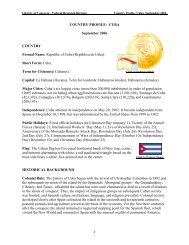1 - American Memory
1 - American Memory
1 - American Memory
Create successful ePaper yourself
Turn your PDF publications into a flip-book with our unique Google optimized e-Paper software.
178<br />
Our conclusions are that the first proposal would be wholly Ineffective, that<br />
the second would be n long, arduous and controversial matter with the results<br />
uncertain, and that the best approach is the third. I>et us now discuss the rea-<br />
sons for these conclusions.<br />
PROPOSAL A. RECOGNIZE REOIO.NAI, EMER0E:^CIES TTSDEB EJISTING LEGISLATION<br />
Since the longshore and maritime industries are subject to Taft-Hartley emer-<br />
gcnc.v dispute procedures and since the airlines are subject to the Railway Labor<br />
Act emergency dispute procedures, it could be argued that the easiest and sim-<br />
plest solution would be to recognize regional as well as national emergencies in<br />
both of these acts, so that were Hawaii once again faced with a cutting of one<br />
of her two lifelines, this would be sufficient emergency to permit the President<br />
to trigger into operation the appropriate emergency dispute legislation.<br />
This action alone would be wholly Ineffective simply because the Railway<br />
Labor Act has not succeeded in dealing with major rail or airline strikes, and<br />
Taft-Hartley has been practically useless in dealing with longshore and mari-<br />
time strikes. Nine times in less than a decade Congress has had to pass ad hoc<br />
legislation to prevent or end crippling rail strikes. The one big airline strike<br />
(1966) outlasted Railway I,abor Act procedures and was only settled after<br />
emergency legislation had passed the Senate and was pending in the House.<br />
Since Taft-Hartley was passed in 1947, it has been invoked 32 times in a<br />
v«st array of industries—coal mining, meatpacking, atomic energy, basic steel,<br />
nonferrous metals, fabricated metal products, shipbuilding, telephone, aircraft-<br />
aerospace, longshore and maritime. On nine of these 32 occasions, the strike has<br />
been resumed after the 80-day procedure WAS exhausted, seven times in long-<br />
shore and two times in the maritime industry. Taft-Hartley may have worked<br />
in the nontran.sportation field, but it has been a dismal failure in the longshore<br />
and maritime Industries.<br />
The conclusion is obvious: merely to Include under Taft-Hartley and the<br />
Railway Labor Act regional emergencies such as would arise if Hawaii were<br />
cut off from the Mainland U.S. would do little, if anything, for Hawaii.<br />
PROPOSAL B. MAKE A MAJOR REVISION OF TArT-HARTLEY AND INCLUDE RAILROADS<br />
AND AIRLINES UNDER THIS ACT RATHER THAN THE RAILWAY LABOR ACT<br />
As already noted, our studies have convinced us (as other studies have con-<br />
vinced almost every student of emergency disputes legislation) that the Railway<br />
Labor Act and the Taft-Hartley Act as it relates to transportation disputes are<br />
relatively ineffective and should be overhauled. With an effective emergency<br />
disputes law that would apply to regional and local emergencies, it is argued<br />
that not only would Hawaii be freed from crippling strikes but that other parts<br />
of the country (while not as seriously affected as Hawaii) would also be freed.<br />
Furthermore, while there is disagreement about details, there is widespread<br />
agreement as to the general form of such legislation.<br />
The majority of students of emergency strike legislation conclude that the<br />
best approach is what is variously called the "choice of procedures" approach<br />
or the "arsenal of weapons" approach. This approach has been described as being<br />
one "under which the President would have the authority in each dispute to<br />
choose from among several different strike controls. . . . Each and every type<br />
of control is attacked on one ground or another: for giving the President too<br />
much power or not enough, for being to vague or too precise, for favoring one<br />
party or the other. How better to make a virtue out of necessity than by<br />
abandoning the fruitless search for a single weapon that the parties will find<br />
equitable and, instead, threatening them with most of the weapons they find<br />
inequitable? Faced with this invitation to play Russian roulette with the man<br />
in the White House, the parties may well elect to .settle their dispute without<br />
a strike."'<br />
The reason why this approach has such appeal is that no one single approach<br />
can possibly fit every situation. As David CuUen .said, "It mu.st now be clear<br />
that one of the easiest parlor games imaginable is puncturing other people's<br />
ideas for handling emergency strikes."' This is because every strike is different.<br />
^ D. CuUen, National Emergency Strikei, Cornell University, Itbaca, N.Y., 1968, pp.<br />
I07-.S.<br />
'IMd., p. 121.



![Albert Einstein Papers [finding aid]. Library of Congress. [PDF ...](https://img.yumpu.com/21604228/1/190x245/albert-einstein-papers-finding-aid-library-of-congress-pdf-.jpg?quality=85)





![American Colony in Jerusalem Collection [finding aid]. Library of ...](https://img.yumpu.com/17941275/1/190x245/american-colony-in-jerusalem-collection-finding-aid-library-of-.jpg?quality=85)



![Piccard Family Papers [finding aid]. - American Memory - Library of ...](https://img.yumpu.com/17941234/1/190x245/piccard-family-papers-finding-aid-american-memory-library-of-.jpg?quality=85)


